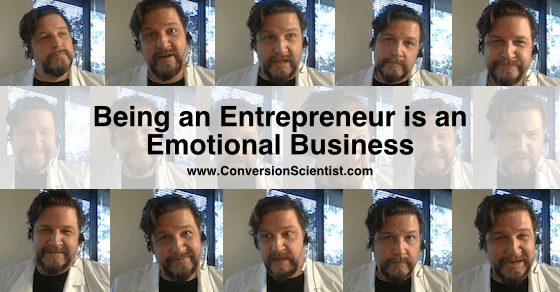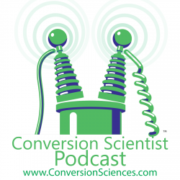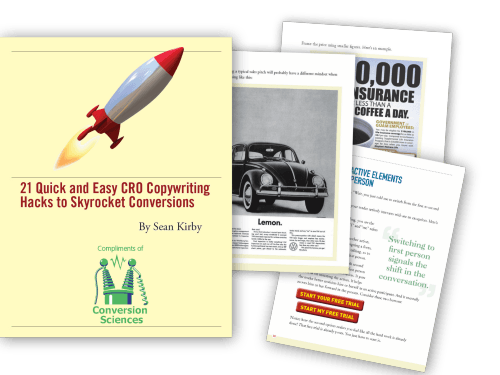Building a Website Optimization Business [AUDIO]
Brian the Conversion Scientist is always excited to share his knowledge about website optimization. He’s also an entrepreneur just like his clients. Dr. Jeremy Weisz from INspired INsider interviewed Brian about his highest and lowest points leading his business.
Brian talks about client negotiations, how he feels about his employees (hint: nothing but good feelings!), and advice for making a better website.
Listen to the full podcast or read the transcript: it’s educational and unexpectedly touching.
Transcript
Jeremy:
Brian, since it’s INspired INsider, I wanted to hear about what’s been a really low moment and how you pushed forward through it, and then on the flip side a proud moment.
Brian:
I think our lowest moment would have to have been when we signed up a do a pay for performance. We had a deal where we were being paid a retainer, and we also got a bonus based on how much we increased their conversion rate.
And as you can imagine on a complex site, it’s really hard to determine how much of a conversion rate increase is due to the market, how much is due to promotions the company was going to do anyway, and how much of it is due to us. But we came up with the formula that would take several different measurements and average them, and if it went to this certain point then we got a certain percentage of revenue.
We had a month go by, and there was a huge increase; it looked like our bonus was going to go through the roof. We had just started, and we know we didn’t make any changes. So we started working vigorously and the next month, they had some specials, and again we had a bonus that was just through the roof.
We felt like we had to stick by our guns because that was the agreement. I mean if every time the bonus coincidentally was in our favor was early on – rather than being lower early on – then we wouldn’t have much of a leg to stand on for future agreements like this one, which by the way we don’t do anymore.
It ended up being a very confrontational negotiation. It came to a good settlement, and we lost a customer. We lost a very interesting customer at that. So that was kind of the low point.
Jeremy:
You mean that they said it wasn’t due to you, so they didn’t want to pay you the bonus?
Brian:
That’s right.
Jeremy:
That’s painful.
Brian:
We said “You might be right it: it may not be due to us or not all of it, but the agreement says this is how we calculate the bonus.” That was the agreement: we’re going to calculate it using this formula. We had offered to cap it, and they said “No, we want you guys to be motivated to really make us rich.” And I think we could’ve, and I wish we had been able to keep going with them.
Jeremy:
How do you navigate that type of negotiation because it is a client relationship, but then also you deserve to be paid a certain amount. I’m sure this happens all the time in a lot of business type of situations. How did you come to the table, and how did you handle the negotiation? Is that an easy process?
Brian:
I think probably the most important thing we did is we got on a plane and flew out there. Being face-to-face made it more confrontational but realistically confrontational. There’s an amazing ability of the human mind to read somebody’s face, so that’s what we decided to do rather than trying to read their voices and faces over the phone. I think that was probably the most important thing.
We never wavered, but we did compromise. We didn’t get the full bonus, but we told them what we were willing to take. We did a good job making our case for it. And you know I think that’s all you can do.
Jeremy:
What would you tell someone if they experience the same situation – someone backs out of an agreement? What advice do you have for them?
Brian:
We talked about litigation, but we didn’t see that as a tactic, and we didn’t use it. I think holding the other side to their highest – even when they get heated and when they sound irrational to you – assume that they’re working for the best, and they’re working for the fairest.
There’s a fundamental difference in the way people will behave if you expect a certain thing from them.
Even in a business situation sometimes somebody’s job is on the line, and they negotiated a bad deal with you. We had one other situation where they said “We didn’t know you were going to charge so much. We didn’t quite understand the agreement.” It was a much smaller amount of money, but hold them to their highest and plan ahead of time where your concession points are. Tell them how much you’re willing to concede and concede slowly. So if you’re talking about $100,000 deal, your concession points are going to be in the $99,000 or $98,000 range.
And don’t worry about seeming unreasonable. You can keep going, but that’s where really where you find out where their concession point is. Find a compromise that you both feel like “I can take that.”
Jeremy:
Lesson learned. Now you don’t do pay for performance.
Brian:
Pay for performance has potentially two outcomes with the wrong organization. I wouldn’t rule it out categorically, but number one, you are wildly successful with them, and you become too expensive to be kept on.
Or number two, you don’t you have inclusive tests for a long period of time, so you’re not making any money with them. Your employees begin to think “Well I’m making money over here with this other client, so I’m going to spend more time on that.” So it never actually gets its fair shake past some of those early failures.
So no it doesn’t work. We do flat rate, fixed price consulting. We don’t even do hourly. It’s a flat rate. It gives us the freedom to do as much as we need to do to delight the customer. And so that’s what you want. You want someone who has the resources to really put a lot of money in your pocket.
Jeremy:
I can see with the first deal the guy made with you that they want you to be motivated, so they didn’t want to cap it which I would think makes perfect sense.
So what about the proudest moment?
Brian:
I think that there have been a number of proudest, but for me the proudest has been really over the last six months. We’ve brought on a new Conversion Scientist, and we’ve had one who has been with us for longer, but the two of them really have delighted clients. They’ve been able to come in, get up the learning curve on reading the tealeaves that are the analytics and all the other research that we do, then consistently deliver wins.
In one case, we started off very rough. We had a couple of inconclusive tests. These were language tests, and we were changing the language on buttons for a barcode company. The control beat everything. We were struggling to get statistical significance because there was also a little bit of “Should we go with this conclusion or not go with this conclusion?” It just felt very rough, so to be able to turn that around and turn it into tripling the conversion rate, it just feels great. We were running on kind of a high.
We’re in demand, and our process is really working. We do have tough clients in other sectors, but it just feels great to see other people catch the disease that I got back in 2006 of “Oh my gosh! This brings everything together!” The data, the technology, the development, and the entrepreneurial side. We’re really scrambling to make more money for our clients, so to see that excitement pop up in your employees feels really good.
Jeremy:
Is it hard to get clients to listen? When you triple conversions they probably say “I’m all ears” but before that in the initial tests, I would think it’s hard to convince them you should do things a certain way for a long time if you have these inconclusive paths.
Brian:
There is a lot of back and forth. Some clients begin to get excited and they come up with their hypotheses, and then we say “We have some of this data from a previous test” or “We saw this over here that says it’s probably not a good hypothesis”. But then other times a client will come to us with a great hypothesis, and we’ll think “Oh my gosh why isn’t that on our list?”
That conversation usually works out well, but what is harder are situations like when we had a client that sold sports memorabilia online. Customers were going to the purchase page and adding something to cart. They’re buying; they are going through the process. Then customers change the state that they live in, so the terms of the shopping cart change, and one of those little twirling rings goes off while it’s going to the database and grabbing the new tax information.
In Internet Explorer, that twirling ring didn’t go away, and it was spinning right next to the credit card number field. Imagine this: you’re about to enter your credit card number, but you’re not about to enter it until the browser says it’s ok. It’s spinning about 30 seconds then another twirling ring pops up, and now you’re thinking “I’m not going to give my credit card to these bozos”. Thirty seconds later, another twirling ring. So you have three of these spinning things.
We decided to design some java script, and we fixed it. We actually ran a test because we wanted to see how big of an impact this was having because this problem was at the buy point.
It was costing them over $1,000,000 a year in revenue!
Jeremy:
Wow that’s amazing.
Brian:
We presented this to them, and they were like “ok”.
So then we were thinking, “Wait a minute, what’s going on here? Why aren’t they more excited?” When we see a test that delivers a 25% increase, when we put it on the site it’s generally going to see a 10-12% increase in actual. There are a lot of other things come into effect and change the results, and you know 25%? That seems ok.
So with the sports memorabilia company, we were thinking, we just made you a million and a half dollars, worst case, and you’re not really reacting. That’s more perplexing to us, when they have no reaction.
Sometimes the person you’re dealing with within an organization is more worried about their job instead of what we’re doing. In enterprise organizations it really is about career advancement, and you can tell that this is not something that they think is going to help get them ahead. They’re just not as excited.
Jeremy:
It’s not their business.
Brian:
It’s an individual or someone who reports directly to the CEO or something. So that’s more frustrating. We’re rah rah’ing, and it’s silence on the other end, and you’re wondering what’s going on. They should be hiring a marching band and marching through our office.
Jeremy:
They’re covering the phone and just screaming or something.
Brian this has been an absolute pleasure. Where can we point people towards? Where should people go to check out more?
Brian:
You know everything we learn, we write about. We’re really a teaching organization because that’s what it’s going to take to get more of these websites up and optimizing. So come to Conversion Sciences.
We post several times a week there: case studies, head-scratchers, things we’ve learned, audio, there’s a lot of video, we’ve got a podcast if you like to listen to things on the commute. And you know we’ve got the data that answers some of the questions that I know are burning in your little brains.
Jeremy:
Conversion Scientist. Yeah, I was reading one this morning: why no one is reading your emails. That was a good one.
Brian:
Everything is fair game.
Jeremy:
So any final thoughts?
Brian:
Entrepreneurs: those of you who are embarking on any business right now are going to have a website to support it. I can’t think of an exception. And you’re going to go hire a web developer or maybe do that yourself. And a designer to tell you what to do. A marketer today is not going to be able to go off and do that anymore but the good news is that the data is readily available.
Even if you’re a little afraid to get a little math-y and maybe understand a little statistics, I strongly recommend that you go and poke around in analytics. Make sure that you’ve got Google Analytics – which is a free tool – installed and start building this database so you can test yourself. That’s where it all starts. Start poking around; I know us entrepreneurs are pokers. We’re going to get to know just enough about a space that we feel confident either winging it or competently hiring someone who can do it for us. You need to be doing that on the site because it will accelerate your growth, especially out of the gate when those few precious leads, few precious sales, few precious users will make or break your business.
Jeremy:
Awesome Brian, thank you so much I really appreciate it.
Brian:
Thanks for having me man. Glad I could come.
- 7 Simple & Effective Ways to Improve Your Email Open Rates - February 23, 2021
- The 3 Most Effective Marketing Strategies For Ecommerce Businesses - December 26, 2020
- Google Ads not Converting? Try These 4 Optimization Tricks - August 6, 2020













